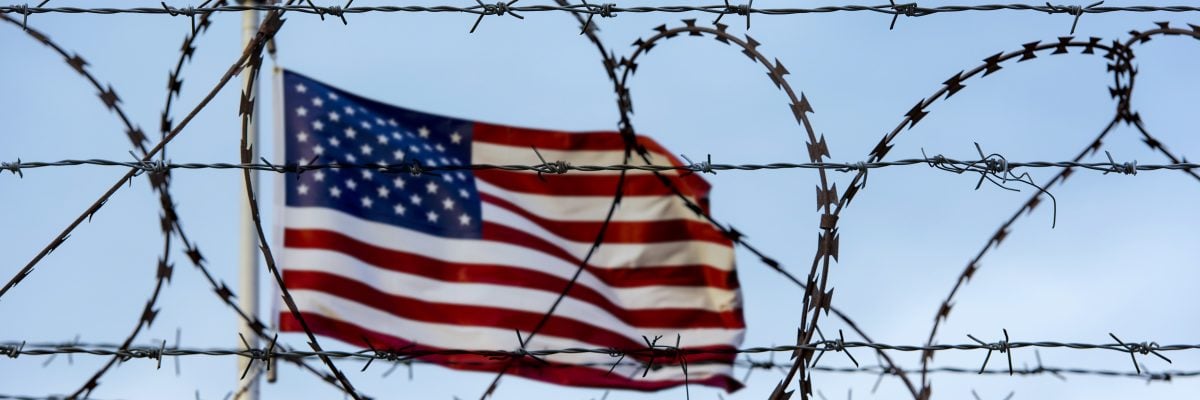
“Can borders be controlled? Yes, each country has a right to control its borders, who enters and who leaves, and countries that are in danger—of terrorism or the like—have more right to control them more . . . “
These words of Pope Francis, delivered in an interview with the Spanish newspaper El País on January 22, likely came as a surprise to those, Catholic and non-Catholic, who assume that the Church is committed to unrestricted immigration. Yet the Holy Father’s words reflect the Church’s longstanding teaching, drawn from natural law, that the nation is an extension of the human family.
As Pope Saint John Paul II wrote in his final book, Memory and Identity: “The term ‘nation’ designates a community based in a given territory and distinguished by its culture. Catholic social doctrine holds that the family and the nation are both natural societies, not the product of mere convention.”
The common good of a nation
As the father of a family has not only the right but also the duty to protect those in his charge, the properly constituted authorities of a state have a duty to use their power to advance the common good of the nation. Should prudential considerations—such as the danger “of terrorism or the like”—suggest that restrictions on immigration are in the common good, those authorities have not only the right but also the duty to impose such restrictions.
As the Catechism of the Catholic Church notes:
Political authorities, for the sake of the common good for which they are responsible, may make the exercise of the right to immigrate subject to various juridical conditions, especially with regard to the immigrants’ duties toward their country of adoption. Immigrants are obliged to respect with gratitude the material and spiritual heritage of the country that receives them, to obey its laws, and to assist in carrying civic burdens (CCC 2241).
If we follow the logic of Pope Francis’s words (which echo not only those of the Catechism but those of his two immediate predecessors in their annual messages for the World Day of Migrants and Refugees, as well as in their other writings on the topic), those who would deny that a country has the right to control its borders are denying that the country has a right to exist. Because a country without some control over its borders has, essentially, no borders at all.
All of this seems so obvious, not only from natural law but from common sense, that one may wonder why anyone would assume that the Church favors unrestricted immigration. Part of the answer lies in the emphasis that is often placed on a separate but related aspect of Church teaching: namely, the personal right of migration that flows from the inherent dignity of the human person.
But while the right of migration speaks to the need to allow someone in straitened circumstances to leave his country of origin (and to bring with him those under his care, his family above all), it does not entail an unlimited right to settle wherever he may wish.
As the Catechism notes (again in para. 2241): “The more prosperous nations are obliged, to the extent they are able, to welcome the foreigner in search of the security and the means of livelihood which he cannot find in his country of origin” (emphasis added).
As the phrase “to the extent they are able” makes clear, the obligation of a country to accept immigrants is not absolute, and it is limited in part by the requirement that the authorities of the receiving country act in the common good of their own nation. The citizen of the receiving country has rights that flow from his inherent human dignity. In his Message for the 87th World Day of Migration 2001, Pope St. John Paul II succinctly summarized them:
Specifically, these are the right to have one’s own country; to live freely in one’s own country; to live together with one’s family; to have access to the goods necessary for a dignified life; to preserve and develop one’s ethnic, cultural, and linguistic heritage; to publicly profess one’s religion; [and] to be recognized and treated in all circumstances according to one’s dignity as a human being.
Cultural stability
Throughout John Paul’s writings on migration and nationhood (including Memory and Identity), as well as in the writings of Pope Benedict XVI, this theme is repeated: cultural stability and the preservation of national identity are elements of the common good, which must be taken into account when a country is determining its immigration policy.
Thus, as John Paul continues in his Message for the 87th World Day of Migration 2001:
The exercise of such a right [that is, the right to immigrate to a particular country] is to be regulated, because practicing it indiscriminately may do harm and be detrimental to the common good of the community that receives the migrant.
Another part of the answer to the common assumption that the Catholic Church is committed to unrestricted immigration flows from the Church’s discussion of how the immigrant who has already been admitted to a particular country must be treated. We find in the Catechism (once again, in paragraph 2241) this admonition: “Public authorities should see to it that the natural right is respected that places a guest under the protection of those who receive him.”
When the Church speaks of “welcoming the immigrant,” it assumes the fact of migration already. Christian charity requires each of us to treat all of those with whom we come into contact with the dignity that they deserve. This speaks, then, not so much to the question of immigration policy (that is, who is allowed to enter the country and under what conditions) but of how immigrants are to be treated once they have arrived.
In this context, popes Francis, Benedict, and John Paul have all discussed the real problem of the economic exploitation of immigrants, including the sexual exploitation of women and children, that all too often afflicts those who have fled their home countries to avoid the trauma of war or famine. In that vein, the Church has also pointed out that migration is often a desperate reaction to the breakdown of society in the migrant’s home country, and that concrete steps should be taken to make migration seem less of a necessity.
As Pope Benedict wrote in his Message for the World Day of Migrants and Refugees 2013:
[E]ven before the right to migrate, there is need to reaffirm the right not to emigrate, that is, to remain in one’s homeland; as [then] Blessed John Paul II stated: “It is a basic human right to live in one’s own country. However, this right becomes effective only if the factors that urge people to emigrate are constantly kept under control.”
A delicate balance
Refugee crises caused by war, famine, and other economic devastation cannot be addressed by demanding that other countries open their borders without due consideration to the common good of their own nation. Efforts must be made to address the conditions in the refugees’ homeland that led to the desire to migrate in the first place.
Immigration policy, then, must balance a country’s duty to advance the common good of its nation with the duty to help others in need, while ensuring that those who are actually allowed to immigrate are treated with the dignity inherent to all human beings. Or, as Pope St. John Paul II put it in his Message for the World Day of Peace 2001:
The challenge is to combine the welcome due to every human being, especially when in need, with a reckoning of what is necessary for both the local inhabitants and the new arrivals to live a dignified and peaceful life.
The prudential application of all of these competing rights and duties belongs to the properly constituted authorities of each country and begins, as Pope Francis said, with the “right to control its borders.”
Scott Richert is the executive editor of Chronicles: A Magazine of American Culture and is the Catholicism expert for About.com (http://Catholicism.About.com).
Photo: The border fence in San Diego, California, extends out into the Pacific Ocean (photo by Serge Dedina).



